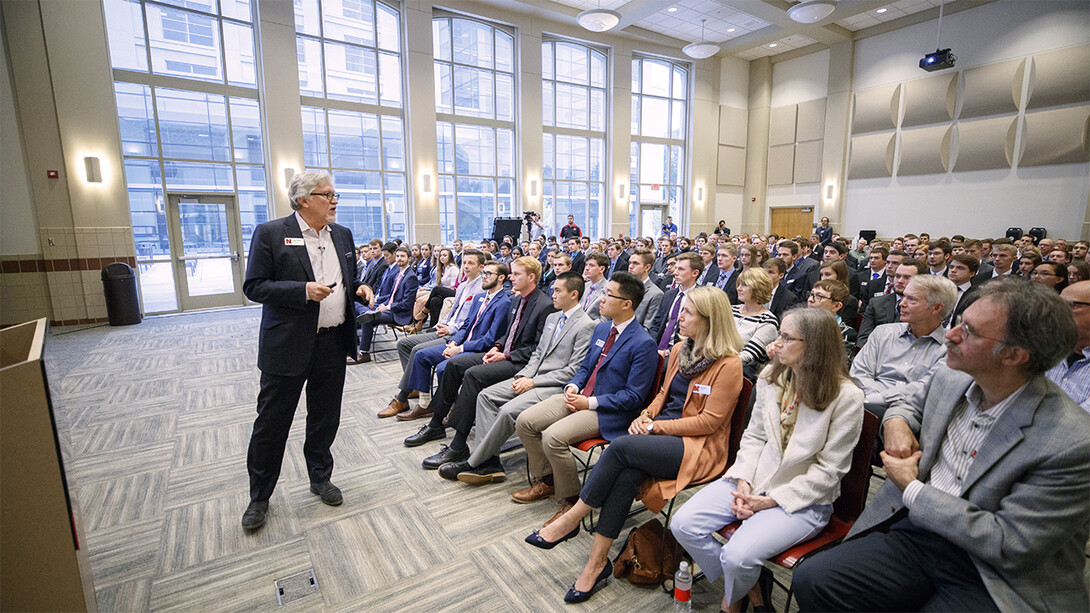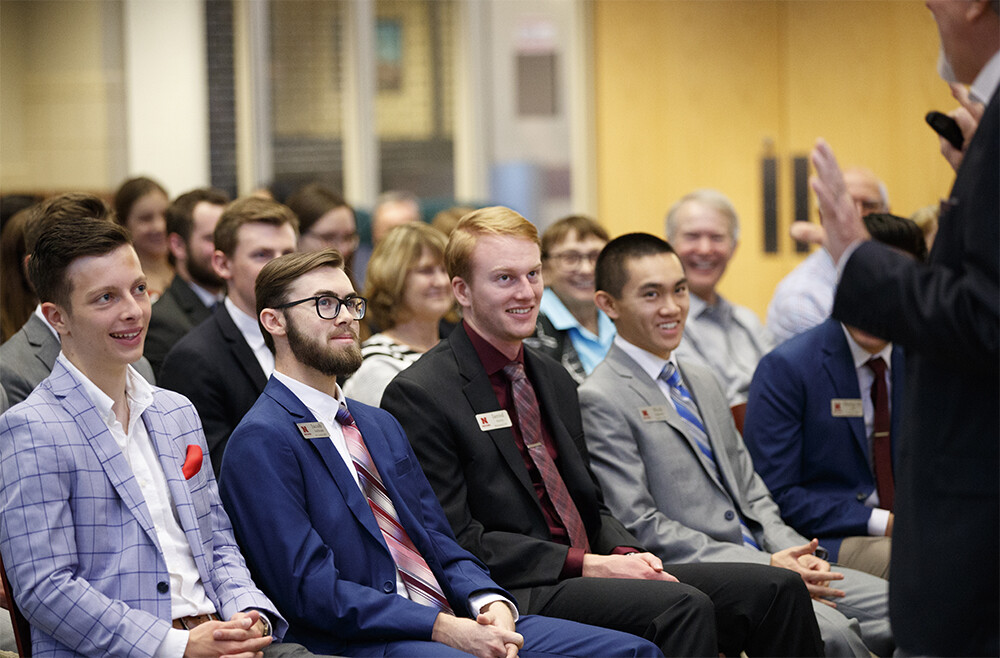
Ten years after a donation transformed the computer science and management program that now bears his name, Jeff Raikes visited the University of Nebraska-Lincoln bearing lessons rooted in an Ashland farm and cultivated through the ranks of Apple, Microsoft and international philanthropy.
Presenting to an audience of about 175 people – many of them students from the Jeffrey S. Raikes School – the Nebraska native shared thoughts on building a purposeful life and career during a Sept. 7 speech that was followed by a question-and-answer session.
Raikes weaved those lessons throughout stories that are the stuff of biographies. Like the time he walked into Bill Gates’ office expecting to be fired (he wasn’t) for a software bug that caused spreadsheets to lose data and forced a $300,000 product recall. Or the time that Steve Jobs tried to keep him from leaving Apple for Microsoft by predicting that the latter wouldn’t last – a prophecy Jobs made in 1981.
But the first and most enduring lessons came from his father and mother on the farm, where he learned to drive a tractor at age 7 and worked in the fields at age 9. Raikes encouraged students to take stock of their values, and crystallize them, before embarking on their own careers.
“It was certainly important to Alice Raikes that I be the best that I could be,” he said of his mother. “She taught that sort of internal competitiveness, and I value that. I value honesty and integrity; you want to work with people you trust. I value a sense of community; the town where I went to high school was only 2,000 people, but that was actually a great way to grow up.”
Raikes said that upbringing also taught him the importance of what he called “work balance,” which has guided him throughout a career that now sees him working full-time with the foundation that he launched alongside wife Tricia in 2002.
“Every farm kid wants to get up that day and drive the tractor or the combine,” he said. “But some days you get to drive the tractor, and some days you scoop hog manure.
“In those days at Microsoft where I got to do really fun things – share the new products that we were (creating) – that was like driving the tractor. There were other days – (with) people issues or business problems or competitive challenges – that weren’t as good. But the fact that I grew up (learning) work balance – I recognized that that’s just the way life is.”

Another long-held principle helped Raikes make the seemingly difficult decision to turn down Jobs’ pitch for remaining with Apple, despite the fact that Microsoft was a mere $12 million company at the time.
“Strive to have your work be your passion, and the rewards will take care of themselves,” he said. “I’ve had too many people close to me … who got all about the money. My stock may not have been worth anything (in the end). I didn’t care. I loved what I was doing. I was given the opportunity to be a part of creating Microsoft Office. That, to me, was mind-blowing.”
Ryan McManaman, a senior in computer science, said Raikes’ emphasis on risk-taking and growing in the face of failure has resonated throughout his time in the program.
“I think that’s something that a lot of people struggle with, especially at this stage, where you’re still growing up and learning a lot about yourself,” he said. “There are going to be failures, because you don’t know who you are yet, so the ability to pick yourself up and move on is one that I value a lot.”
Sophomore Lara Quiring echoed the sentiment, saying she’s grateful that Raikes sets aside time to return and personally invest in the program’s students.
“Especially in a program like this – where we’re so privileged to have scholarships, housing, amazing professors and amazing opportunities – it’s really important to remember that we still need to actively be pursuing excellence rather than expecting it to be handed to us,” she said.
The director of the Raikes School, Steve Cooper, met Raikes in 2015. A longtime software engineer and researcher, Cooper said he got accustomed to meeting Silicon Valley heavyweights while a professor at Stanford University. Though some of those entrepreneurs funded his work, Cooper said, he came to realize that most were in it for their own gain rather than for the sake of the work itself.
Before meeting Raikes for the first time, Cooper was likewise warned to prepare for a “real tough Silicon Valley type.”
“Jeff wasn’t like that at all,” Cooper said. “At the end of my conversation (with him), I realized what the difference was: Jeff isn’t about Jeff. Jeff is about Nebraska, about the University of Nebraska-Lincoln, and about the school.”







